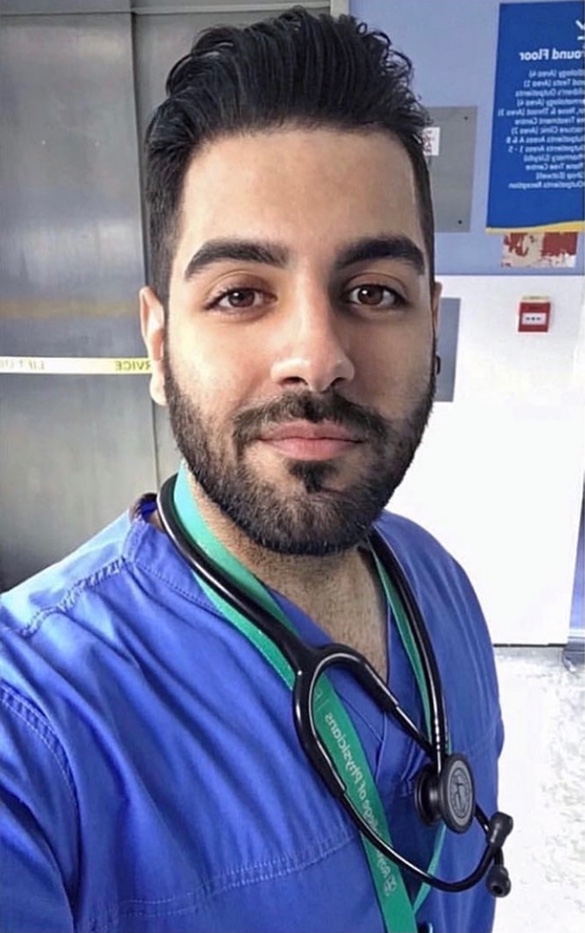Alumni profile - Shayan Ashjaei
(Physician Associate Studies Msc, 2019)
I graduated from Barts and The London School of Medicine and Dentistry back in 2019 as one of the first cohorts of Physician Associates, which are relatively new in the NHS.

Tell us about your career as a Physician Associate.
I graduated from Barts and The London School of Medicine and Dentistry back in 2019 as one of the first cohorts of Physician Associates, which are relatively new in the NHS. We are medically trained generalist healthcare professionals with a background in healthcare. I came across the role of a Physician Associate when I was working as an HCA during my undergraduate studies and met a neurosurgery Physician Associate, when I didn’t know anything about the role. I looked into the profession and felt that it offered what I’m looking for in a career, particularly the flexibility and work-life balance (which is highly important to me). Although our postgraduate training is only two years compared to a traditional five-year undergraduate degree, it is incredibly intense and highly clinical. I have to say my background in Biochemistry and Neuroscience came in handy prior to applying for the Physician Associate training. However, just like any other healthcare professionals, trying to adapt yourself to this new situation is really tricky. It was a massive leap as someone who has just qualified, but I have learnt so much from that time. The things that they teach you… you see it happening for yourself. I have witnessed all five stages of grief. I have seen patients in devastating conditions, but I’m glad that I’ve had the experiences. I think, like a vaccination, I needed the experience to be a better clinician.
What was your background before becoming a Physician Associate?
I graduated from Barts and The London School of Medicine (QMUL) in 2019 as one of the first cohorts of Physician Associates and subsequently passed the UK National Licensing Examination in May. Prior to this, I was awarded an MSc in Neuroscience, specialising in Neurodegeneration from King's College London and obtained a BSc (Hons) in Biochemistry from the University of Westminster.
Why did you become a Physican Associate?
I actually met a neurosurgery Physician Associate whilst I was banking as an HCA at King’s during my MSc in Neuroscience studies and she inspired me to look into the profession. What really attracted me to this profession was the flexibility and the work-life balance that it offers whilst allowing you to practice medicine. Also, I have always been passionate about teaching and being a Physician Associate does allow me to fulfil that dream further.
What does an average day look like for you?
I have been working at King's College Hospital since July 2019 as the first neurology Physician Associate in my Trust. My day to day activities is quite similar to our SHOs/JCFs on the ward, from participating on the Ward Rounds, seeing and examining patients with a wide variety of backgrounds, attending my special interest clinics where I was trained to perform LPs, skin and muscle biopsies. On top of that, I have also contributed to the 3rd year medical students clinical examination at KCL, and have been involved as a teaching fellow for F1s and IMT/CMT trainees in procedural and theoretical teaching once a week.
How has your work been affected by the COVID-19 pandemic and how have you had to adapt?
Back in April 2020 during the first wave, I was redeployed and allocated to the sickest patients who were palliative. No matter what you do, it is very difficult to win.
Back in April 2020 during the first wave, I was redeployed and allocated to the sickest patients who were palliative. No matter what you do, it is very difficult to win. It wasn’t exciting. Every day you’re going to work and seeing patients dying. You’re having conversations with their families and it’s not easy. Mentally and physically, it has affected me. I’m sure every healthcare worker in the NHS has been affected. I just don’t think any form of training would prepare you for that.
What’s the best part of working in neurology?
Neurology is a fascinating speciality with loads of research opportunities. One of the main reasons I enjoy working in this speciality is the variety it offers in the day to day practice. It also offers a close working relationship with staff from a wide spectrum of specialities, enabling you to learn beyond your area of expertise. As biased as it sounds, I would certainly recommend it to any Physician Associate who has passion in neurology…you will not get bored as every day seems like a new day, with loads of teaching and surprises!
If you would like to get in touch with Shayan or engage them in your work, please contact the Alumni Engagement team at alumni@qmul.ac.uk.